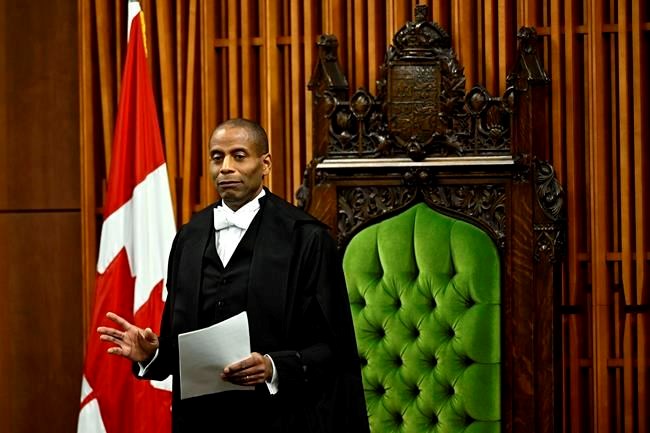OTTAWA — As the House of Commons comes to grips with whether and how it should operate differently after parliamentarians unwittingly applauded a man who fought for the Nazis last fall, the new Speaker has a few ideas.
One such proposal: certain guests who are to be recognized in the chamber should first be screened for their reputations, as well as whether they pose a physical threat.
Clerk Eric Janse shared the Speaker's suggestions during a parliamentary committee hearing on Tuesday.
Rather than looking at "reputational risks" for all guests to Parliament, Janse said, one idea is to "only do reputational verifications on anybody who might be recognized in the gallery by any of the individuals addressing Parliament."
He said Fergus has also suggested to House leaders that information about guests being recognized should be shared with all political parties.
That way, "everybody can undertake their own background checks, if they will, before sharing with their group or caucus whether or not this person should be applauded," Janse said.
Guests are currently only screened for physical threats, and staff rarely have the time to do an in-depth analysis of all risks, Janse told the procedure and House affairs committee.
Yaroslav Hunka was on the guest list in September to hear a speech by Ukrainian President Volodymyr Zelenskyy in the Commons chamber.
Hunka, a Ukrainian Canadian man, had fought for the Waffen-SS Galicia Division during the Second World War. It was a voluntary unit created by the Nazis to help fight the Soviet Union.
The former Speaker of the House, Anthony Rota, took responsibility for inviting the 98-year-old and recognizing him as a hero in front of the crowd.
He resigned amid international controversy, and in October, Fergus was elected to succeed him.
In his apology, Rota said he alone was responsible for the invitation and that neither the Prime Minister's Office nor the Ukrainian delegation had been aware of it.
Prime Minister Justin Trudeau also apologized on behalf of Parliament.
Russia has continued to call back to what happened as it tries to advance propaganda seeking to legitimize its full-scale invasion of Ukraine.
"I think I speak for all parliamentarians in expressing our embarrassment for that event," government House leader Steven MacKinnon said Tuesday.
"The prime minister himself expressed his regrets and apology to President Zelenskyy."
The Conservatives continue to argue that the Prime Minister's Office was to blame, saying the government had a responsibility to vet attendees of such a high-profile event.
But the Liberals and Janse, a nonpartisan public servant, say otherwise.
"As (has) been the subject of much discussion, guest lists provided to the parliamentary protocol office are not shared with other parties or groups," the clerk said.
"And in keeping with the principle of the independence of Parliament, they are not shared with the government, either."
When there's a joint parliamentary address, parties and groups are each allotted a certain number of invites.
"To date, we've always expected parties to do some kind of background check before submitting their names to us," Janse said.
The guest lists are shared with parliamentary security, which verifies names in a database and assists with accreditation, Janse said.
But he noted they're not screened for reputational threats, "which in any event would be difficult to achieve in the very short time available for the organization of such ceremonies."
Patrick McDonell, the Sergeant-at-Arms and corporate security officer for the House, said a reputational check on 500 people would take weeks.
"If I was mandated to do it, I'd have the resources to do an open source verification," McDonell said Tuesday. "It would be an open source intelligence search."
A spokesman for the Speaker's office says Fergus's draft guidelines for recognizing certain guests in the House of Commons remains with House leaders and other officers of Parliament for consultation.
"Speaker Fergus looks forward to receiving any recommendation from (the committee) as to how the process may be improved going forward," said Mathieu Gravel.
This report by The Canadian Press was first published Feb. 13, 2024.
Mickey Djuric, The Canadian Press



